中考英语话题知识拓展 topic4 日常活动(常用句型+重难点解析)
九年级unit4知识点 句型总结

九年级unit4知识点句型总结九年级Unit 4 知识点句型总结Unit 4是中学九年级英语课程中的一单元,主要涉及与旅行相关的话题。
下面将对这一单元中的一些重要知识点和句型进行总结。
一、与交通工具相关的句型:1. How do you usually go to school?2. I usually go to school by bike.3. What's your favorite means of transportation?4. My favorite means of transportation is the subway.这些句型主要用来询问和描述人们通常使用的交通工具。
学生可以根据自己的实际情况,回答自己每天上学使用的交通方式,并谈论自己最喜欢的交通工具。
二、与旅行相关的句型:1. Have you ever been to Beijing?2. Yes, I have been to Beijing.3. No, I have never been to Beijing.4. What do you think of the Great Wall?5. I think the Great Wall is amazing.这些句型涉及到对旅行经历和旅游景点的讨论。
学生可以描述自己去过的地方,也可以表达对某些景点的看法。
三、与旅行计划相关的句型:1. Where are you going for your summer vacation?2. I am going to Hainan for my summer vacation.3. What are you planning to do there?4. I am planning to go swimming and explore the local culture.这些句型用于询问和描述学生暑假计划的目的地和计划活动。
中考英语考点话题四 日常活动
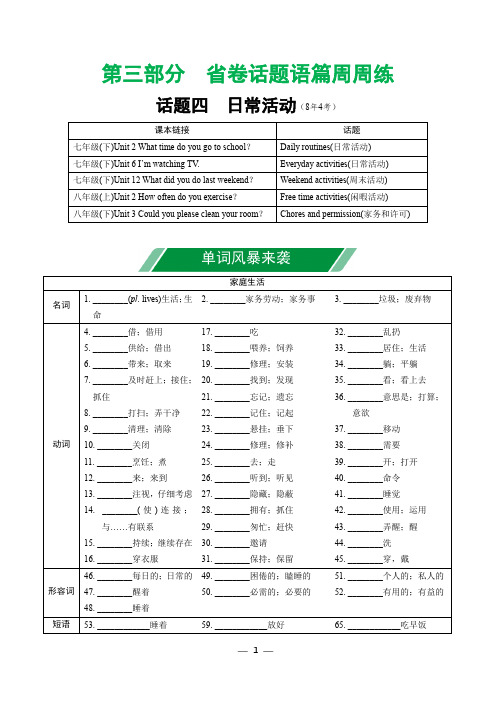
第三部分省卷话题语篇周周练话题四日常活动(8年4考)一、完形填空(2020原创)V olunteers are probably some of the most overlooked (被忽视的) by people. But no activity would carry on smoothly without hardworking volunteers. This month, I volunteered at the Color Run in Melbourne. Although I didn’t have as much fun as the runners, I still 1 an unforgettable lesson.My__2__ was to give a highfive to every runner at the finishing line. At the beginning, I saw it as a __3__ task. When the first runner passed, I __4__ my hands and said “Good job” excitedly. However, as more and more people crossed the finishing line and touched their hands with mine, my arm got tired. What made things worse was that the weather became hotter. My clothes were all wet because of the sweat (汗水). But soon I saw a group of kids running __5__ me—they were about six years old. Although they could hardly catch their breath (呼吸), they still kept going with big __6__ on their faces. They __7__ their hands and said, “Highfive!”At that moment, I was__8__ moved—they were so young, but they refused to give up. Suddenly, I felt myself full of energy again. I clapped (拍) their hands, and said, “Well done!”That is the 9 of being a volunteer. It is never an easy job. However, volunteers can meet different people and feel the spirit that moves them. __10__ such spirit is not often found in daily life, it still can encourage them a lot.1.A.wanted B.gave C.wished D.learned 2.A.job B.goal C.sign D.power3.A.stupid B.hard C.clever D.simple4.A.blew out B.reached out C.brought out D.checked out 5.A.towards B.before C.around D.behind 6.A.surprises B.shames C.smiles D.worries 7.A.cut off B.put up C.took over D.turned on 8.A.quite B.often C.only D.mainly 9.A.advantage B.courage C.meaning D.ability10.A.But B.Until C.And D.Although 二、阅读理解A(2020原创)1. Among the following activities, ________ is not included in this spring field trip.A. flying kitesB. cookingC. bicycle ridingD. crafts2. When can you take part in the Day Camp?A. 9:00 a.m.-2:00 p.m.B. 11:00 a.m.-3:00 p.m.C. 9:00 a.m.-3:00 p.m.D. 11:00 a.m.-2:00 p.m.3. You will have to ________ for the Day Camp.A. payB. bring your own lunchC. ask for a volunteerD. bring your own family4. How can you take part in the Day Camp?A. Make a call or send an email.B. Write a letter or make a call.C. Get information from parents.D. Visit it with the help of friends.5. The main purpose of this activity is to________.A. make students relaxed from school workB. encourage more people to do volunteer workC. help children make more friendsD. greet guests in a special wayB(素材源自impact Book 4)打扫机器人Like most people at my age, I hate cleaning up my room. My mom always tells me that if I don’t like to do it, I can save my money to buy a robot that will clean up for me. She’s joking, of course, but her joke gives me an idea. What if I really could get a robot to clean up my room?As a member of my school’s robot club, I’m learning that it might actually be possible to make, not buy, this robot. My idea, Droidganizer, would build on technological devices that already exist to help around the house. Currently, there are robotic devices that vacuum(用真空吸尘器清扫) and mop the floor by using sensors(感应器) to control their movement. Robots also have the ability to pick things up with robotic limbs(四肢). Droidganizer would combine these applications into a single device.What would really set Droidganizer apart from current devices is its monitor. A Droidganizer owner would put the monitor on somewhere around the ceiling in the room. The person would clean and tidy the room for the first time, and then use the monitor to take a photo of how the room should look. The monitor would store this information. Then, it would check the room from the ceiling. Whenever the room doesn’t match the photo, Droidganizer would automatically(自动地) fix the problem. It would pick up clothes or books on the floor and put them away. It might also make the bed. Droidganizer could even be programmed to vacuum dust, or clean the windows!Anyone would be happy to have a Droidganizer to do the dirty work. If only Droidganizer exist now! People could be using their time to study, play sports, or hang out with friends—not clean the room!1. __________ gave the writer the idea of inventing the robot.A. His father’s jokeB. His mother’s jokeC. His club’s adviceD. His school’s order2. The underlined word “applications” in the second paragraph means ________.A. 计划B. 目的C. 用途D. 方法3. __________ makes Droidganizer different from the current devices.A. Its shapeB. Its informationC. Its programD. Its monitor4. How do you feel if you have the Droidganizer?A. Very happy.B. Very proud.C. Quite tired.D. Quite bored.5. What does the passage mainly tell us?A. The writer has invented the robot—Droidganizer.B. The writer wants to invent the robot—Droidganizer.C. The writer is studying how to create a robot.D. The writer doesn’t have to do housework anymore.C(2020原创)配对阅读左栏是五个人想去了解的事项,右栏是对七种不同事项状况的介绍,请为不同的人找到适合的事项。
中考英语话题模块复习—日常活动
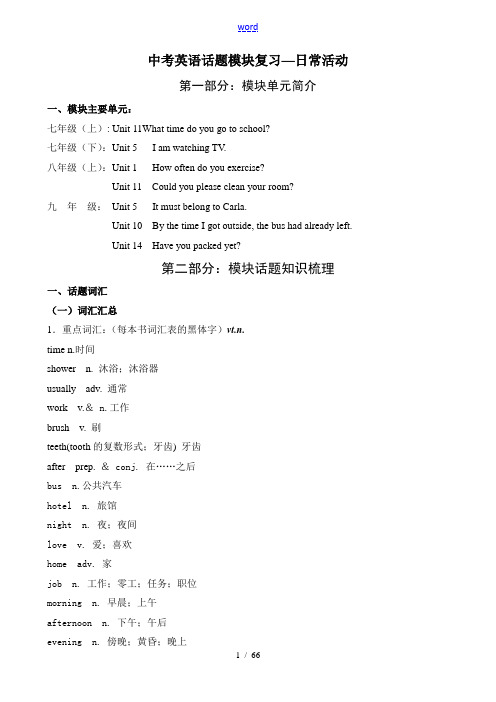
中考英语话题模块复习—日常活动第一部分:模块单元简介一、模块主要单元:七年级(上): Unit 11What time do you go to school?七年级(下):Unit 5 I am watching TV.八年级(上):Unit 1 How often do you exercise?Unit 11 Could you please clean your room?九年级:Unit 5 It must belong to Carla.Unit 10 By the time I got outside, the bus had already left.Unit 14 Have you packed yet?第二部分:模块话题知识梳理一、话题词汇(一)词汇汇总1.重点词汇:(每本书词汇表的黑体字)vt.n.time n.时间shower n. 沐浴;沐浴器usually adv. 通常work v.& n.工作brush v. 刷teeth(tooth的复数形式;牙齿) 牙齿after prep. & conj. 在……之后bus n.公共汽车hotel n. 旅馆night n. 夜;夜间love v. 爱;喜欢home adv. 家job n. 工作;零工;任务;职位morning n. 早晨;上午afternoon n. 下午;午后evening n. 傍晚;黄昏;晚上letter n. 信around adv. 大约start v. 开始;出发write v. 书写;写tell v. 告诉;讲述soon adv. 不久wish n. 希望;祝愿clean v. 打扫;清除read v 读;阅读sure adv. 当然;的确wait v. 等待;等候activity n. 活动shop v. 买东西;购物pool n. 水池;水塘camera n. 照相机visit v. 拜访test n. 考试;测试stay v. 停留;留下have v. 做;进行;从事practice v. 练习;实践past adj. 过去时态的;以前的;过去的mountain n. 山;山脉geography n. 地理学spend v. 度过;过week n. 星期;周middle adj.中等的most adj. 大多数的;大部分的;几乎全部的song n. 歌曲anything pron. 任何事;无论何事exercise v. & n.锻炼;运动sakteboard v. 踩滑板hardly adv. 几乎不;几乎没有ever adv. 曾;曾经once adv. 一次twice adv. 两次time n. 次;次数internet n. 网络;互联网program n. (戏剧、广播、电视等的)节目;表演result n. 结果;成果active adj. 活跃的;积极的for prep.对于;关于;在……方面;就……而言(表示时间、距离、数量等)达;计about adv. 几乎;大约milk n. 牛奶coffee n. 咖啡chocolate n. 巧克力drink v. 喝;饮health n. 健康;健康状况habit n. 习惯try v. 试图;设法;努力grade n. 分数;成绩better adj. & adv. (good和well的比较级)更好的(地);(健康状况)好转达的same adj. 同样的;相同的as prep. 像……(一样)different adj. 不同的;有区别的difference n. 不同;差异;区别maybe adv. 或许;大概although conj. 虽然;即使;纵然keep v. 保持;使保持某种状态must modal v. 必须less adj. (little的比较级)比较小的;更小的;较少的;更少的piic n. (自带食物的)郊游野餐possibly adv. 可能的;或许;也许drop v. 落下;掉下count v. 计;值final adj. 最后的;最终的owner n. 所有者;业主sky n. 天;天空catch v. 捕获;赶上(车船等)interview v. 访问;会见;接见noise n. 噪音;喧闹声;嘈杂声director n. 主管;主任monkey n. 猴子smell n. 气味;嗅觉finger n. 手指lift v. 举起;抬起;提升stone n. 石头;石块wind n. 风neighbor n. 邻居;邻人rush v. 冲;奔lock v. 锁;锁上empty adj. 空的;空闲的drscribe v. 描述;描绘farmer n. 农夫;农场主mary v. 嫁;与……结婚water v. 浇灌;浇水wood n. 木头;木材farm n. 农场;农庄ocean n. 海洋hit n. 成功而轰动一时的事物(如歌曲等)appear v. 出现;露面;(公开)演出turn n.(依次轮流到每个人的)一次机会2.其他词汇surf v. 在……冲浪;在激浪上驾(船)dunk n. 废弃的旧物;破烂物chip n. (食物等的)薄片cola n. 可乐interviewer n. 采访者lifestyle n. 生活方式unhealthy adj. 不健康的;不益于健康的chore n. 杂务;杂事;(尤指)日常的普通工作trash n. 垃圾;废物fold v. 折叠;折起来laundry n. 洗衣店;待洗或已洗好的衣物snack n. 小吃;快餐teenager n. (13至19岁的)青少年player n. 唱机crucil adj. 关键的;至关重要的anxious adj. 忧虑的;焦虑的;不安的worried adj. 烦恼的;焦虑的chase v. 追逐creature n. 生物;动物unhappy adj. 不快乐的;不愉快的extremely adv. 极其;非常footstep n. 足迹garbage n. 垃圾;废料mystery n. 神秘的事物;不可思议的事物;谜escape v. 逃跑;逃走ant n. 蚂蚁dishonest adj. 不诚实的pretend v. 假装;伴若attempt v. 试图oversleep v. 睡过头;睡得过久relative n. 亲人;亲戚fool v. 愚弄;欺骗n.愚人;白痴costume n. 服装;全套服装embarrassed adj. 尴尬的;窘迫的exhausted adj. 极其疲惫的;精疲力竭的announce v. 宣布;通告convince v. 使确信;使信服panic n. 恐慌;惊恐thrill v. 使非常激动;使非常紧Xending n. 结局;续尾embarrassing adj. 令人为难的bathing n. 游泳;洗澡suit n. 衣服;服装towel n. 手巾;毛巾guidebook n. 旅行手册;指南refrigerator n. 冰箱garage n. 汽车库;汽车间suitcase n. (旅行用)小提箱;衣箱chop v. 砍light v. 点燃;点着well n. 井;水井anyway adv. 不管怎样;不论用何种方式wave n. 波浪;波涛scene n. 舞台lead n. 主角poem n.诗;韵文cupboard n. 食橱;碗橱;衣橱after class 课后agree to do sth.同意做某事agree with sb. 同意某人的看法,与某人看法一致as usual 通常,平常地be strict with 对……严格要求call up 号召,打belong to 属于be proud of 骄傲,自豪catch up with 赶上(或)超过e from 出生(于),来自e out 出来,(书等)出版,发行e true 变为现实,成为事实e up with 追上,赶上;想出(主意);找出(答案)pare to 与……相比cut up 切碎do one’s best 尽最大的努力depend on(upon) 依靠,相信,信赖be different from 与……不同do some cleaning (shopping……) 做扫除(买东西)enjoy oneself=have a good time 过得愉快even if 即使,尽管face to face 面对面feel like doing 想要……,感觉要……find out 查明,发现,了解first of all 首先from now on 从今以后,今后from then on 从那时起get along with 与……相处get up起床give back 归还;送回give out 分发give up放弃get to (arrive at/in; reach) 到达go fishing(shopping, skating) (去)钓鱼(习东西,滑冰)go on doing…继续干某事,不停地干某事go on with 继续go over 仔细检查,复习go through 浏览;翻阅,通过grow up 长大成人,成长had better(do) 最好(做)hand in 上交;交纳hand out 分发hear from 收到……的来信help oneself to 请随便吃点help sb. with sth. 帮助某人做某事help..out 帮助某人解决困难in a word 总之in fact事实上,实际上in surprise 吃惊,惊讶in the end 最后,终于instead of 代替,而不是keep doing sth. 继续做某事keep off 勿踏;勿踩keep up 保持;维持;继续look forward to 盼望make friends with 与……交朋友make up one’s mind 下决心more or less 或多或少no longer=not any more 不再on time 准时on show 展出,在上演over and over again 反复,多次重复pick up 拾起,捡起;开车去接……put away 储存put off 推迟run away 逃跑,失控run out of 用完so far 到目前为止so…that 太……以至于……stop doing sth. 停止做某事stop to do sth. 停下来做某事take off 脱下,起飞take one’s time 从容,慢慢行动take out 取出talk about 谈论,议论the more…the more…越……就越……used to sth. 习惯于used to do sth. 过去常常wait for 等侯,等待wake up 醒来work out 算出,解决write down 写下,记下write to 写信给……dress oneself 自已穿衣服get (be) ready for 为……做准备(二)词汇训练1.翻译下列短语1、多久一次______________2、至于___________3、一周三、四次_______________4、洗餐具_______________5、取出_____________6、处理琐事_______________7、洗衣服_______________8、整理床铺_______________9、照看_______________10、回来_______________11、顺便来访_______________12、闲荡_______________13、睡过头_______________14、属于_______________15、用完、耗尽_______________ 16、到……时候_______________17、迅速离开_______________18、清除、打扫干净_____________19、首先;作为开始_____________20、洗澡_______________ 2用括号内所给词的适当形式填空。
2020广东中考高分突破英语--话题四 日常活动(外研版)

my parents did 1e. v_e_r_y_t_h_in__g________ for me. Actually, they
managed every minute of my life.①Although they loved me,
I felt a bit unhappy with them. “Zheng Chenyu, do your
n.最后
v.持
返回
英语
72.busy a.忙(碌)的 73.free a.自由的,空闲的;免费的 74 mon a.普通的;公共的 75.asleep a.睡着的,熟睡的 76.sleepy a.想睡的,困倦的 77.awake v.唤醒 a.醒着的 ual a.通常的,平常的 79.daily a.每日的;日常的 ad.每天 80.sometimes ad.有时
返回
英语
I happily threw my schoolbag on the sofa and ate lots of snacks. Then I enjoyed an exciting film on TV, and after that I played computer games. I liked the games so much that I played until midnight. The next morning I woke 6. _u_p______ late. I had to hurry to scool 7. _w__it_h_o_u_t_____ breakfast, but I was still late.
I wanted Mum and Dad to come home soon.Mum cooked such delicious food, and 11. __m__a_d_e_s_u_r_e_ (确保) I never forgot my homework.Dad always helped me
九年级英语unit4知识点综合
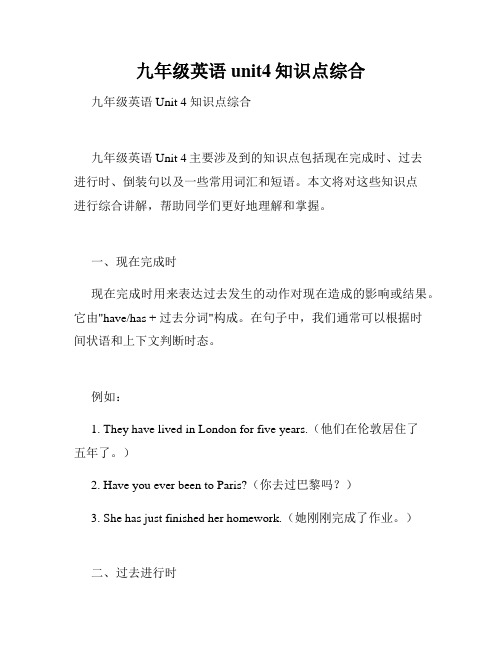
九年级英语unit4知识点综合九年级英语Unit 4 知识点综合九年级英语Unit 4主要涉及到的知识点包括现在完成时、过去进行时、倒装句以及一些常用词汇和短语。
本文将对这些知识点进行综合讲解,帮助同学们更好地理解和掌握。
一、现在完成时现在完成时用来表达过去发生的动作对现在造成的影响或结果。
它由"have/has + 过去分词"构成。
在句子中,我们通常可以根据时间状语和上下文判断时态。
例如:1. They have lived in London for five years.(他们在伦敦居住了五年了。
)2. Have you ever been to Paris?(你去过巴黎吗?)3. She has just finished her homework.(她刚刚完成了作业。
)二、过去进行时过去进行时表示过去某个时刻或某段时间内正在进行的动作。
它由"was/were + 动词的现在分词"构成。
同样,我们可以根据时间状语和上下文判断时态。
例如:1. They were playing volleyball at 5 o'clock yesterday.(昨天五点的时候他们正在打排球。
)2. What were you doing when I called you?(我给你打电话的时候你在做什么?)3. She was watching TV when the phone rang.(电话响的时候她正在看电视。
)三、倒装句倒装句是英语中常用的一种句型结构。
在某些特定情况下,主语和谓语的语序会颠倒过来。
下面是倒装句的一些常见情况:1. 在以副词here、there、now、then、up、down等开头的句子中,将这些副词置于句首,谓语动词和主语颠倒位置。
例如:Here comes the bus.(车来了。
)There is a dog in the park.(公园里有一只狗。
中考英语总复习 第3部分 话题专项突破 第4节 日常活动课件

动词
1. study学习 2. read读;阅读 3. write写 4. understand理解 5. begin开始 6. dance跳舞 7. sing唱歌 8. draw绘画 9. review复习
第七页,共十四页。
名词
周末活动
1. movie/film电影 2. concert音乐会 3. shopping购物 4. hiking远足;徒步旅行 5. picnic野餐 6. game游戏 7. race比赛 8. sport运动 9. rest休息 10. mountain山 11. park公园 12. activity活动
第十一页,共十四页。
• 三、重点(zhòngdiǎn)句子 • 1. I usually watch TV with my parents at night. 我
晚上通常和我的父母一起看电视。
• 2. I often help my mom wash the dishes after dinner. 我经常饭后帮助我妈妈洗碗。
动词
1. chat聊天 2. clean/sweep打扫 3. wake唤醒;醒来 4. watch看 5. sleep睡觉 6. dress穿衣 7. cook煮 8. wash洗 9. water浇水
第五页,共十四页。
学校生活 1. exam/examination考试 2. test测验,测试;考查,考试 3. lesson课,课程;经验;教训 名词 4. class班级;课 5. homework家庭作业 6. bell钟(声);铃(声)
第十四页,共十四页。
• 4. cook dishes做菜
• 5. go for a walk散步
2020-2021年中考英语四轮话题突破 话题四:日常活动
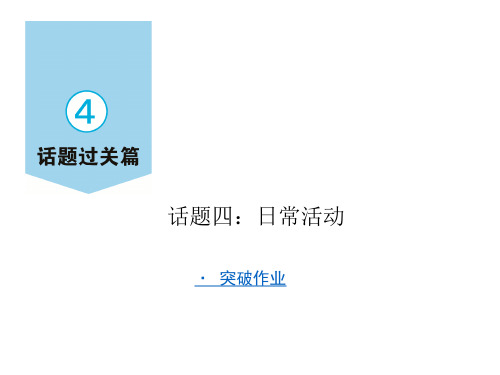
—He eats breakfast at seven o__'c_l_o_c_k__.
话题 常用 句型
(3)—What time does Scott go to w__o_r_k____? —He always goes to work _____a_t__ eleven o'clock.
2.谈论人们正在做的事情: (1)—What are you doing?
与习 惯用 语
7.__m__a_k_e__ the bed 整理床铺
9.__w__as_h___ face 洗脸
8.do morning _e_x_e_rc_i_s_e_ 做早操 10._b_r_u_s_h___ one's teeth
刷牙
11.have _b_re_a_k_f_a_s_t 吃早餐 12.go to _s_c_h_o_o_l__ 去上学
58.__w_o_r_k___ on 从事/忙于
60.w__a_it_____ for 等候……
类别
话题 词块 与习 惯用 语
主要知识盘点
61._c_o_m_p_a_r_e_ A with B 62.how __o_f_te_n___
将A与B作比较
多久一次
63.__tw_i_c_e___ a week 每周两次
39.have a _p_ic_n_i_c___ 去野餐
40.go _c_a_m_p_i_n_g_ 去露营
41.a lot of=__lo_t_s____ of 42.remember _t_o_d_o____
许多/很多
sth.记住去做某事(未做)
43.remember _d_o_i_n_g___ 44.forget __to__d_o___ sth. sth.记住做过某事(已做) 忘记去做某事(未做)
中考英语话题知识拓展 Topic4 日常活动(常用句型 重难点解析)
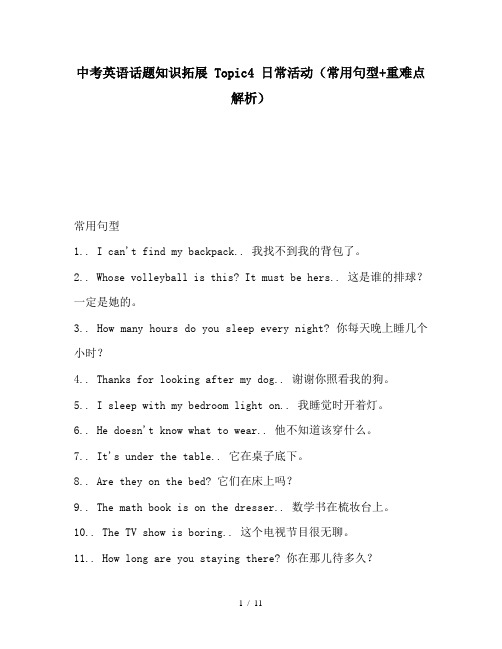
中考英语话题知识拓展 Topic4 日常活动(常用句型+重难点
解析)
常用句型
1.. I can't find my backpack.. 我找不到我的背包了。
2.. Whose volleyball is this? It must be hers.. 这是谁的排球?一定是她的。
3.. How many hours do you sleep every night? 你每天晚上睡几个小时?
4.. Thanks for looking after my dog.. 谢谢你照看我的狗。
5.. I sleep with my bedroom light on.. 我睡觉时开着灯。
6.. He doesn't know what to wear.. 他不知道该穿什么。
7.. It's under the table.. 它在桌子底下。
8.. Are they on the bed? 它们在床上吗?
9.. The math book is on the dresser.. 数学书在梳妆台上。
10.. The TV show is boring.. 这个电视节目很无聊。
11.. How long are you staying there? 你在那儿待多久?
1 / 11。
人教版九年级Unit 4话题和语法复习
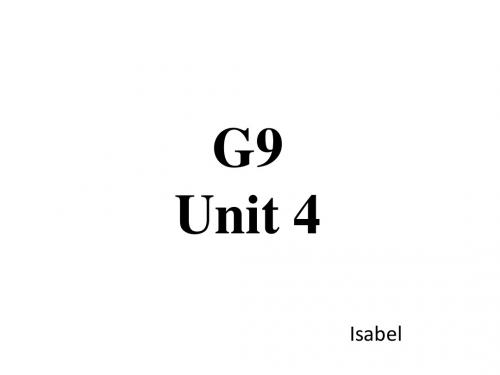
6. 这位父亲被建议去和他女儿亲自谈谈。(suggest)
7. Bill不如以前那样对电脑游戏感兴趣了。(use)
The father was suggested that he (should) talk to his daughter in person. Billy is not as/ so interested in playing computer games as he used to (be).
used to + v. 结构
2). used to的疑问形式: ①used提前,放到句首 ②在句首加Did,并把used变成use (其肯定和否定回答也相应的有两种形式。) e.g. —Used you to have a walk after supper? = Did you use to have a walk after supper? —Yes, I used to. = Yes, I did.
G9 Unit 4
Isabel
一、单元话题:
谈论自己或他人过去的性格。(拓展:通过对比描 述如今的改变) 1. 陈述自己在外表、性格、娱乐等方面的变化, 常用短语used to表示过去的情况,用but表示对 比说明现在的情况。 e.g. I used to be afraid of dark. But now I an not. I used to be outgoing in school. But now I am quiet. 2. 讨论某人过去的状况。 e.g. Billy has changed so much! He used to be so shy and quiet. used to do sth.
be used to doing sth.
九年级上unit4知识点

九年级上unit4知识点九年级上Unit 4 知识点Unit 4的知识点主要包括三个部分,分别是动词时态、虚拟语气和基本句型转换。
下面我将针对这些知识点进行详细的解析。
一、动词时态1. 一般现在时:表示经常性的动作、习惯或普遍真理。
例如:I often go to the park on weekends.2. 一般过去时:表示在过去某个时间发生的动作或状态。
例如:She visited her grandparents last weekend.3. 一般将来时:表示将来某个时间会发生的动作或状态。
例如:We will have a party tomorrow.4. 现在进行时:表示现在正在进行的动作。
例如:He is watching TV now.5. 过去进行时:表示过去某个时间正在进行的动作。
例如:They were playing basketball yesterday.6. 将来进行时:表示将来某个时间正在进行的动作。
例如:Iwill be studying tonight.7. 现在完成时:表示过去某个时间开始并持续到现在的动作或状态。
例如:He has lived here for five years.8. 过去完成时:表示过去某个时间之前已经完成的动作或状态。
例如:They had already finished their homework when I arrived.二、虚拟语气1. 与现在事实相反的虚拟语气:用于表示与现在事实相反的假设情况。
例如:If I were you, I would study harder.2. 与过去事实相反的虚拟语气:用于表示与过去事实相反的假设情况。
例如:If she had studied harder, she would have passed the exam.3. 与将来事实相反的虚拟语气:用于表示与将来事实相反的假设情况。
教师开讲:Unit4语法知识点的讲解和练习方法
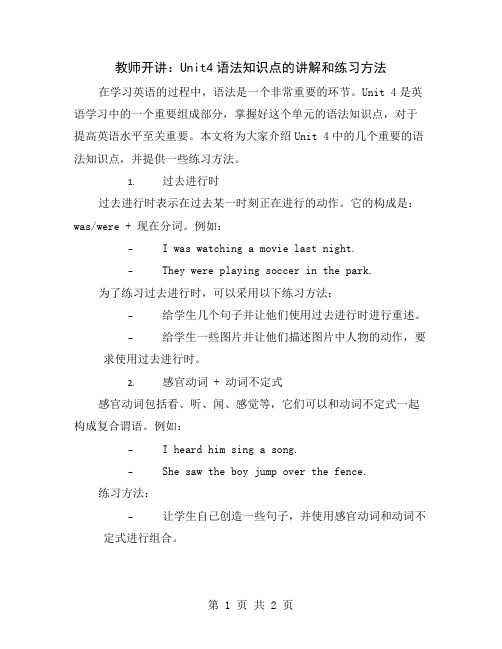
教师开讲:Unit4语法知识点的讲解和练习方法在学习英语的过程中,语法是一个非常重要的环节。
Unit 4是英语学习中的一个重要组成部分,掌握好这个单元的语法知识点,对于提高英语水平至关重要。
本文将为大家介绍Unit 4中的几个重要的语法知识点,并提供一些练习方法。
1.过去进行时过去进行时表示在过去某一时刻正在进行的动作。
它的构成是:was/were + 现在分词。
例如:-I was watching a movie last night.-They were playing soccer in the park.为了练习过去进行时,可以采用以下练习方法:-给学生几个句子并让他们使用过去进行时进行重述。
-给学生一些图片并让他们描述图片中人物的动作,要求使用过去进行时。
2.感官动词 + 动词不定式感官动词包括看、听、闻、感觉等,它们可以和动词不定式一起构成复合谓语。
例如:-I heard him sing a song.-She saw the boy jump over the fence.练习方法:-让学生自己创造一些句子,并使用感官动词和动词不定式进行组合。
-选择一些有趣的视频或音频,并让学生描述他们所听到或看到的内容。
3.宾语从句宾语从句是由一个连接词(例如that、whether、if、why等)引导的、在句子中充当宾语的从句。
例如:-She believes that he is telling the truth.-I don't know whether he will come or not.练习方法:-给出一些有趣的话题,并请学生用宾语从句回答问题。
-让学生选择一些名言并用宾语从句重新表达。
4.否定意义的词否定意义的词包括no、not、never、neither、nor等。
这些词经常用于否定句子和疑问句。
例如:-I have no money.-He never drinks coffee.练习方法:-让学生构造一些与否定意义的词有关的句子,并使用正确的语法结构。
中考复习话题四 日常活动课件资料

返回
英语
( D )1.Vlog is the short form of
.
A.video log
B.victory blog
C.victory log D.video blog
( C )2.
vlogs are posted every hour on YouTube.
A.90 million B.1.72 million
C.sing C.fish C.active B.looked out of D.looked up C.songs C.bored C.dead C.challenge C.sometimes C.freedom
D.jump D.thief D.afraid
D.stones D.tired D.sick D.introduce D.ever D.happiness
英语
第二部分 话题专项训练
话题四 日常活动
中考英语复习话题四日常活动

10.C 考查名词辨析。medicine“药品”;life“生活”;education“教育”; news“新闻”。可汗学院可供人们在网上学习使用,它是一个在线教育网站,故C项 符合语境。
第二部分 话题专项训练
第二部分 话题专项训练
第二部分 话题专项训练
话题四 日常活动(Daily routines)
第二部分 话题专项训练
1
相关单元:Grade 7 Book 2 Unit 2 What time do you go to school? Grade 7 Book 2 Unit 6 I'm watching TV. Grade 7 Book 2 Unit 12 What did you do last weekend? Grade 8 Book 2 Unit 3 Could you please clean your room?
Unlike other online courses, Khan's videos only use his 3_______ and a digital blackboard for writing.He says he doesn't want a human 4________ to distract(使分心) students.Khan also makes his clasnutes so that students don't 6_______interest.They can also earn points from taking these classes.
第二部分 话题专项训练
2
话题表达之日常活动-中考英语一轮复习语法知识课件(通用版)

知识储备
【课文经典】 1. After that, I usually exercise at about ten twenty. 然后我通常在大约十点二十分锻炼。(7下教材P8) 2. In the evening, I either watch TV or play computer games. 在晚上, 我要么看 电视要么玩电脑游戏。(7下教材P11) 3. There we put up our tents and made a fire to keep us warm and cook food on. 在那里我们搭起帐篷, 生火取暖并做饭。(7下教材P71) 4. Although many students like to watch sports, game shows are the most popular. 虽然很多学生喜欢看体育节目, 但游戏节目是最受欢迎的。(8上教材P13)
真题示范
(2021·昆明中考) 爱是荒漠甘泉, 滋养你的心灵; 爱是长夜明灯, 指引你前进的方向。生活中 爱无处不在, 它或来自你的父母、家人; 或来自你的老师、朋友、同学甚至陌 生人。请你用英文以“Life is full of love”为题写一篇短文, 叙述一个你经历过 的充满爱的故事。 要求: 1. 语言流畅、书写规范、卷面整洁, 词数不少于60个; 2. 文中不得使用你的真实姓名、校名, 否则以零分计。 ____________________________________________________________________ ____________________________________________________________________
话题表达之日常活动 重难知识点复习
中考英语考点解密 第一部分 话题知识梳理 Topic 4 日常活动 试题(共11页)
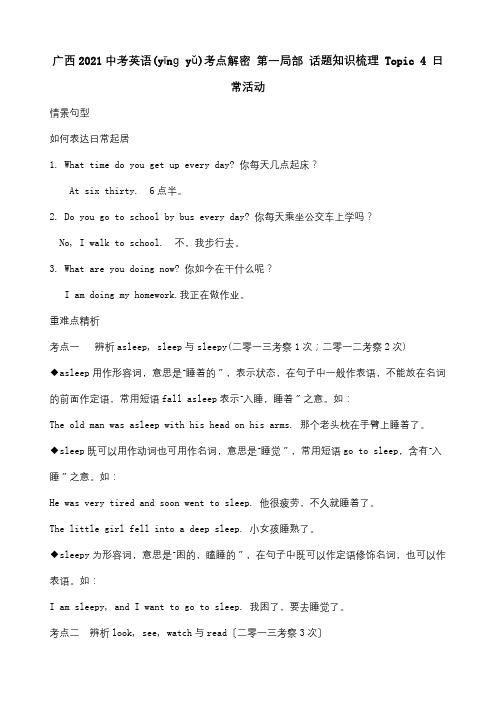
广西2021中考英语(yīnɡ yǔ)考点解密第一局部话题知识梳理 Topic 4 日常活动情景句型如何表达日常起居1. What time do you get up every day? 你每天几点起床?At six thirty. 6点半。
2. Do you go to school by bus every day? 你每天乘坐公交车上学吗?No, I walk to school.不,我步行去。
3. What are you doing now? 你如今在干什么呢?I am doing my homework.我正在做作业。
重难点精析考点一辨析asleep, sleep与sleepy(二零一三考察1次;二零一二考察2次)◆asleep用作形容词,意思是“睡着的〞,表示状态,在句子中一般作表语,不能放在名词的前面作定语,常用短语fall asleep表示“入睡,睡着〞之意。
如:The old man was asleep with his head on his arms. 那个老头枕在手臂上睡着了。
◆sleep既可以用作动词也可用作名词,意思是“睡觉〞,常用短语go to sleep,含有“入睡〞之意。
如:He was very tired and soon went to sleep. 他很疲劳,不久就睡着了。
The little girl fell into a deep sleep. 小女孩睡熟了。
◆sleepy为形容词,意思是“困的,瞌睡的〞,在句子中既可以作定语修饰名词,也可以作表语。
如:I am sleepy, and I want to go to sleep. 我困了,要去睡觉了。
考点二辨析look, see, watch与read〔二零一三考察3次〕◆look作动词,指集中(jízhōng)注意力看,强调“看〞的动作,可单独成句;后接宾语时加介词at;作系动词表示“看起来〞,后接形容词作表语。
话题02.日常活动-中考英语写作热点话题句型表达+范文模板
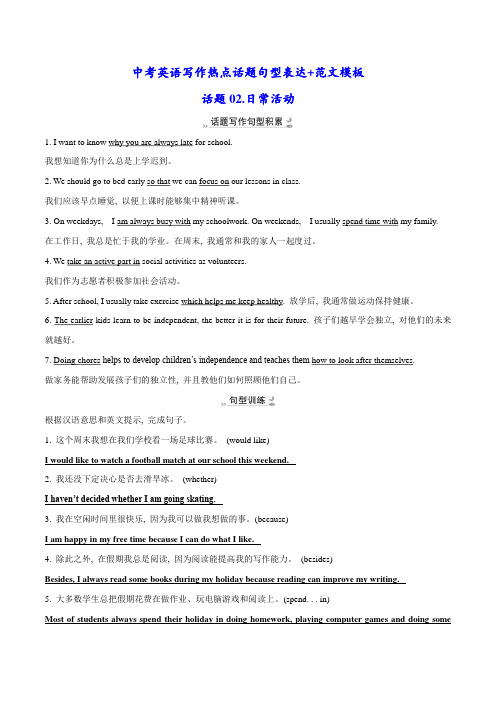
中考英语写作热点话题句型表达+范文模板话题02.日常活动1. I want to know why you are always late for school.我想知道你为什么总是上学迟到。
2. We should go to bed early so that we can focus on our lessons in class.我们应该早点睡觉, 以便上课时能够集中精神听课。
3. On weekdays, I am always busy with my schoolwork. On weekends, I usually spend time with my family.在工作日, 我总是忙于我的学业。
在周末, 我通常和我的家人一起度过。
4. We take an active part in social activities as volunteers.我们作为志愿者积极参加社会活动。
5. After school, I usually take exercise which helps me keep healthy. 放学后, 我通常做运动保持健康。
6. The earlier kids learn to be independent, the better it is for their future. 孩子们越早学会独立, 对他们的未来就越好。
7. Doing chores helps to develop children’s independence and teaches them how to look after themselves.做家务能帮助发展孩子们的独立性, 并且教他们如何照顾他们自己。
根据汉语意思和英文提示, 完成句子。
1. 这个周末我想在我们学校看一场足球比赛。
(would like)I would like to watch a football match at our school this weekend.2. 我还没下定决心是否去滑旱冰。
- 1、下载文档前请自行甄别文档内容的完整性,平台不提供额外的编辑、内容补充、找答案等附加服务。
- 2、"仅部分预览"的文档,不可在线预览部分如存在完整性等问题,可反馈申请退款(可完整预览的文档不适用该条件!)。
- 3、如文档侵犯您的权益,请联系客服反馈,我们会尽快为您处理(人工客服工作时间:9:00-18:30)。
日常生活常用句型1. I can't find my backpack. 我找不到我的背包了。
2. Whose volleyball is this? It must be hers. 这是谁的排球?一定是她的。
3. How many hours do you sleep every night? 你每天晚上睡几个小时?4. Thanks for looking after my dog. 谢谢你照看我的狗。
5. I sleep with my bedroom light on. 我睡觉时开着灯。
6. He doesn't know what to wear. 他不知道该穿什么。
7. It's under the table. 它在桌子底下。
8. Are they on the bed? 它们在床上吗?9. The math book is on the dresser. 数学书在梳妆台上。
10. The TV show is boring. 这个电视节目很无聊。
11. How long are you staying there? 你在那儿待多久?12. He is late for the party. 这次聚会他来晚了。
13. Linda's room is very clean every day. 琳达的房间每天都很干净。
重难点精析考点一辨析be used to doing sth,used to do sth与be used to do sth. (2008陕西完成句子5题)be used to doing sth表示习惯于做某事。
to在这里是介词,后接名词或动名词。
如,The teacher is used to going to bed late in the evening.那个老师习惯于晚睡觉。
used to do sth意为过去常常做某事,表示过去习惯性、经常性的动作或状态,和现在对比,现在不做了。
to为不定式符号,后跟动词原形。
如,I used to go shopping on Saturdays,but now I no longer do so. 过去我经常星期六去购物,但我现在不那样了。
be used to do sth表示被动,意为被用来做。
如,Computers are used to help people do many things. 电脑被用来帮助人们做很多事情。
考点二 how词组辨析(2012陕西23题)how often 多久一次,常用于对often/always/usually/sometimes/never/hardly/three times a day/every day等表示频度的副词或短语提问。
如,How often do you go hiking with your brother? Every month. 你和你哥哥多久去远足一次?每个月都去。
how soon多久以后,一般用于将来时态中,往往对in+时间段进行提问。
如,—How soon will Avatar II be on show?《阿凡达2》什么时候上映?—In two years. 两年内。
how long意为多长时间,谓语动词必须是延续性动词,常用于对for+时间段等时间短语进行提问,另外也有对长度进行提问,表示多长。
如,—How long will the cruise take? —Three hours.海上航游需要多久?三个小时。
how far多远,用于对距离进行提问。
如,How far is the new supermarket away from here? 新超市离这儿有多远?考点三辨析sleep, go to sleep与go to bed/stay upsleep作名词讲是睡觉、睡眠。
sleep与a连用时,特别是前面有形容词修饰时,表示“一段睡眠,一种……的睡眠”。
如:a short/good/restful sleepsleep用作动词指睡、睡着的全过程,用于现在进行时态中表示“正在睡觉”。
如:Please be quiet. My mother is sleeping.go to sleep=fall asleep意为“入睡”(asleep常用表语表示入睡的状态)如:She is often tired because she can't go to sleep after she goes to bed.go to bed指“上床睡觉”,强调从脱衣服到上床这一动作,表示准备睡觉,不含睡着之意,与之相对的短语是get up。
stay up意为“熬夜,睡得晚”。
【参考范文】How to Keep Good Relationship with ParentsIn my opinion, I have too many rules at home. My parents never allow me to go out with my friends at nights.They don't allow me to choose my own clothes, either. And they pay too much attention to my exam results. I think my parents don't quite understand me. However, I try my best to understand them. Although they don't allow me to make my own decisions and give me too much pressure,I know that it is because they really love me and want me to have a bright future. In order to keep good relationship with my parents, I study hard, listen to them, talk to them as friends, tell them my troubles,and help them do more housework.(二)日常动作常用句型1. I usually get up at 7:00 and go to bed at 10:00. 我经常七点起床,十点睡觉。
2. What are you doing? 你在做什么?3. Is Nancy doing her homework? 南希在做作业吗?4. Let's do it at six o'clock. 六点再做这个吧。
5. She's writing a letter. 她在写信。
6. What's her waiting for? 她在等什么?7. Ben and Tim are talking to a policeman. 本和蒂姆在和警察交谈。
8. I watch TV every day. 我每天都看电视。
9. How often do you watch TV? 你多久看一次电视?10. I exercise once a week. 我一个礼拜做一次运动。
11. What do you usually do at weekends? 你周末一般做什么?12. Do you want to go to movies? 你想去看电影吗?13. What do you want to do? 你想做什么?14. I have lunch at school with my classmates together. 我中午和同学一起在学校吃午饭。
15. My father often walks to work. 我爸爸经常走着去上班。
16. My mother makes the bed and cooks dinner every day. 妈妈每天收拾床铺和做饭。
17. My family takes a walk in the park every weekend. 我们家人每个周末会去公园散散步。
重难点精析考点一辨析speak, say, talk与tellspeak既可指说话的能力,也可表示“演讲;发言”。
另外,其后可接语言类词汇。
如:He is speaking at the meeting. 他正在会上发言。
say强调说的内容。
如:Fangfang says she is at home. 芳芳说她在家。
talk指两人或更多的人在进行谈话。
talk to/with sb表示“与某人交谈”,talk about sb/sth表示“谈论某人/某事”。
如:They are talking about the weather. 他们在谈论天气。
tell侧重指“告诉”,可以和lie,story等词搭配。
如:From his face we could see that he was telling a lie. 从他的表情我们可以看出他在撒谎。
考点二辨析forget to do与forget doing.(2010陕西25题)forget to do 忘记要去做某事。
(未做) (反义:remember to do sth,记着要去做某事)如:She forgot to call me. 她忘记给我打电话了。
(她没打过)forget doing 忘记做过某事。
(已做) (反义:remember doing sth,记着已经做某了事)如:She forgot calling me, so she called me again. 她忘记了已经给我打过电话,所以又打了一次。
(她打过了,但忘了,所以又打了一次。
)类似用法的词还有remember to do sth 记得做某事,remember doing sth 记得做过某事。
考点三 call的用法call作动词时,意为“打电话”,其常见用法如下:Please call this evening.请今晚打电话。
call+sb. “给某人打电话”。
如:Please call Bob this evening.今晚请给鲍勃打电话。
call+电话号码“拨打某一电话号码”。
如:Please call 2377485 now.请现在拨打2377485。
call+sb.+at+电话号码“给某人打电话”。
如:Please call my teacher at 65774839.请打65774839给我的老师。
